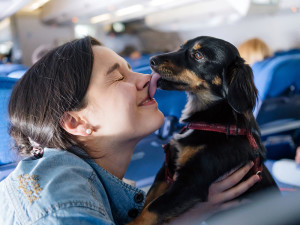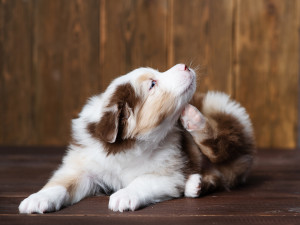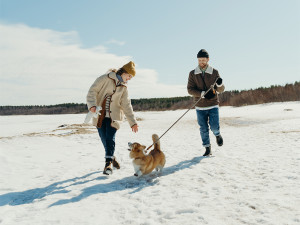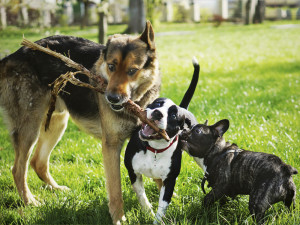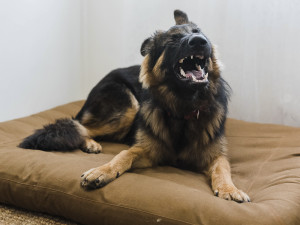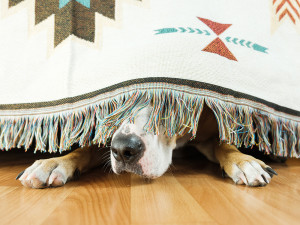Why Is Your Dog Obsessed With Licking Their Paws?
Their toes might smell like Monster Munch, but there’s no way they taste that good
“Finger-lickin’ good” might be KFC’s slogan, but it’s definitely not the cutest look for your dog. And when your dog licks their paws, the issue could be something more serious than bad manners. Although paw licking is a common behaviour in dogs and sometimes a basic part of grooming, a history of excessive licking could be a big red flag for their health. Plus, constant licking can also cause a secondary infection (bacterial or yeast) because of the extra paw moisture.
“While humans with allergies often have sniffling and sneezing, animals with environmental allergies often show signs through their skin,” says Dr Kristi Flynnopens in new tab, an assistant professor and veterinarian at the University of Minnesota College of Veterinary Medicine. So if your pup’s paying extra attention to their toes, there might be a deeper problem going on.
Why do dogs lick in the first place?
Let’s start with the most basic behaviour: self-grooming. You’ve probably noticed your dog licking their paws before a snooze on the sofa, and that’s completely normal. When this behaviour intensifies, that’s a problem, and the cause is often environmental.
“The most common cause of paw licking is generally environmental allergies, also called atopic dermatitis,” says Dr Flynn. “Other causes of licking paws can include ectopic parasites such as fleas or mites, referred pain from arthritis – licking the feet or limbs since they can’t reach the painful joint.”
The good news here is that many of the causes of a dog’s paw licking can be resolved at home, and those that can’t often are treatable with the help of allergy medications prescribed by your vet.
Common causes for paw licking
Environmental allergies
For environmental allergies such as atopic dermatitis, increased ear-scratching and foot-licking are common reactions to things like grass, mould spores, dust mites and plant pollens. If you find your dog licking excessively and more frequently after trips to the park or a walk, they likely have an environmental allergy. “Fortunately there are excellent treatment options for this, but an easy first step is to rinse the pollens and other allergens off their feet. This can also help remove bacteria and yeast, which can be involved in secondary infections,” says Dr Flynn. Symptoms of environmental allergies in dogs can include itchy skin and ears, paw licking, rashes and sometimes running eyes.
Flea allergies
When a dog’s immune system overreacts to flea saliva, it’s called flea allergy dermatitis (FAD). This allergic reaction causes an irritation in the skin, which usually results in an extremely itchy sensation for the poor pup. Dogs will typically scratch and lick their paws and rump in an attempt to soothe the itch caused by flea allergies. Fur loss, thickened skin, redness and hot spots are common symptoms indicative of flea allergy dermatitis.
Food allergies
Food allergies occur when your dog’s immune system overreacts to something (a protein or complex carbohydrate) in the ingested food. An important note is that a food allergy differs from a food sensitivity, in that allergies will cause an immediate immune reaction versus just digestive irritation. “Food allergies are rare in dogs and generally manifest as itching rather than facial swelling as we see in people,” explains Dr Flynn. The most common foods that cause allergies in dogs include beef, dairy, wheat, egg and chicken. Your vet can help you check your dog’s food and treats for ingredients that might be irritating them. Symptoms to watch out for include itchy skin, chewing, hot spots, diarrhoea and vomiting.
Dry skin
Dry skin causes a dog’s skin to become irritated, cracked and flaky (dandruff). Flaky skin can be caused by many things, including excessive bathing, which removes a dog’s natural oils, dry humidity, or the allergies mentioned above. It’s important to follow a good grooming schedule to ensure your dog’s coat stays healthy. If your dog has dry skin, you may notice overall itchiness, redness and dandruff.
Injury or illness
Another potential cause for a dog’s excessive licking is an injury to the paw itself. In the summer, pet parents should watch out for more than just allergies as a potential culprit. “There are also seasonal causes of paw licking such as a blown pad – where the surface is blistered or abraded off – caused by a dog running on hot asphalt or a rough surface like a tennis court,” says Dr Flynn. “And in the winter, road salt can be very irritating and cause dogs to lick their paws.” While uncommon, Dr Flynn notes there are more serious causes for concern when it comes to paw chewing, including deep soft tissue infections, toe fractures, nail bed disease, autoimmune disease, and in rare cases, even cancer.
Obsessive and anxious behaviour
It’s important to rule out any medical conditions before looking at behavioural issues, Dr Flynn cautions. Dogs, like people, often seek ways to comfort themselves in times of stress. “This behaviour can be a form of self-soothing for pain, or in some cases anxiety,” says Dr Flynn. Is there a change in environment (noises, routine, new pets or people) that might cause your dog to seek this form of stress relief? In addition to stress, some dogs have canine compulsive disorder, which is a form of OCD. Common compulsive behaviours for dogs with CCD include paw licking, toy/blanket sucking, tail licking and tail chasing. Try to identify the causes of your dog’s stressful and anxious behaviour, and use redirection and exercise to relieve it.
Boredom
While any breed can be overcome by boredom, it most typically affects working breeds, including but not limited to: German Shepherds, German Shorthaired Pointers, Golden Retrievers, Great Danes, Irish Setters, Labrador Retrievers and Pointers. When boredom sets in, a dog may simply distract themselves by licking when searching for something to do.
How to prevent paw licking
Hot spots, lick dermatitis, bacterial infections and yeast infections are secondary causes of concern with excessive paw licking. Check your dog’s paw pads, in between their toes and along their legs for anything that might be causing irritation. If you think your dog is licking or chewing too much, it’s essential you prevent further licking and reach out to your vet for an evaluation.
“A dog will make a mountain out of a molehill and can do a lot of damage in a short amount of time,” says Dr Flynn. “Rinsing the foot with lukewarm water then drying it thoroughly may help make the area more comfortable in the meantime.” While you are waiting to be seen by your vet, consider getting an e-collar (cone) or basket muzzle to prevent injury.
You know your dog better than anyone else. To help identify an abnormal situation, you must first know what is normal for your dog. Changes in health are often subtle or happen over a long time, making noticing a problem more difficult.
When diagnosing your dog’s issue, your vet will need to know a detailed history of the problem, so keep a record. “Diagnosis is based on signalment (age and breed of dog), history (itch before rash or rash before itching), distribution of itching, as well as diagnostic testing such as cytology or treatment trials,” says Dr Flynn. “Pet parents should watch for itching that is more than what a normal dog would do – a few times a day – swelling, or skin sores or lesions. Any of these warrants a visit to your vet”
As always, if you have any concerns whatsoever – especially if the paw chewing is sudden, excessive and persists for long periods of time – it’s best to have your vet assess your dog.


